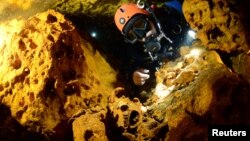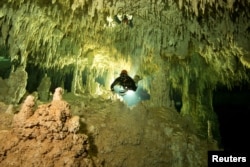Pollution is threatening the recently mapped Sac Actun cave system in the Yucatan Peninsula, a vast underground network that experts in Mexico say could be the most important underwater archaeological site in the world.
Subaquatic archaeologist Guillermo de Anda said the cave system's historical span is likely unrivaled. Some of the oldest human remains on the continent have been found there, dating back more than 12,000 years, and now-extinct animal remains push the horizon back to 15,000 years.
He said researchers found a human skull that was already covered in rainwater limestone deposits long before the cave system flooded around 9,000 years ago.
De Anda said over 120 sites with Maya-era pottery and bones in the caves suggest water levels may have briefly dropped in the 216-mile (347-kilometer) -long system during a drought about 1,000 A.D. And some artifacts have been found dating to the 1847-1901 Maya uprising known as the War of the Castes.
Humans there probably didn't live in the caves, de Anda said, but rather went down to them "during periods of great climate stress, to look for water."
Sac Actun is "probably the most important underwater archaeological site in the world," he said.
But de Anda said pollution and development may threaten the caves' crystalline water.
Some of the sinkhole lakes that today serve as entrances to the cave system are used by tourists to snorkel and swim. And the main highway in the Caribbean coast state of Quintana Roo runs right over some parts of cave network. That roadway has been known to collapse into sinkholes.
Also, the cave with the stone-encased skull has high acidity levels, suggesting acidic runoff from a nearby open-air dump could damage skeletal remains.
The world's other great underwater site, the sunken Egyptian city of Alexandria, is also threatened by pollution.





